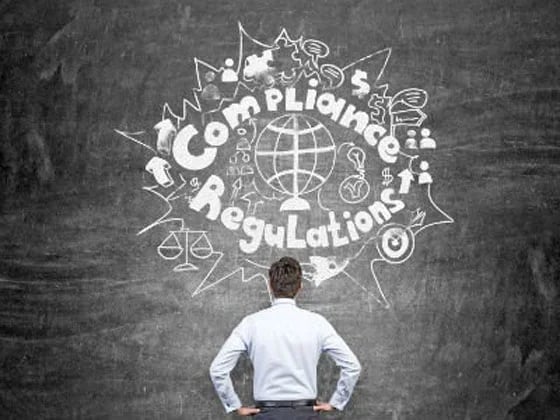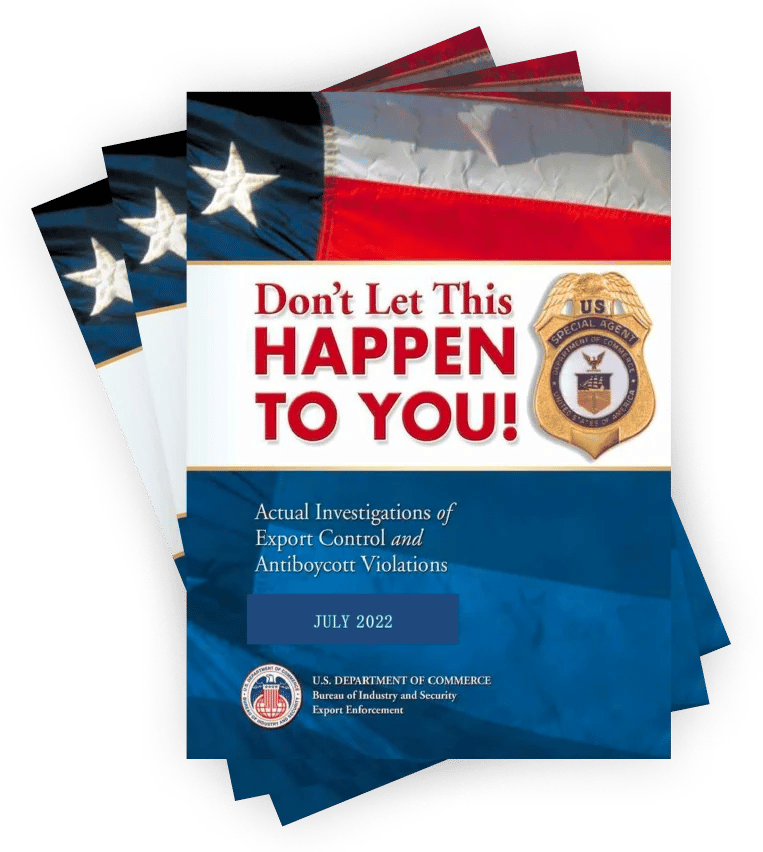The International Trade Blog Export Compliance
Export Compliance: You Can Outsource Responsibility, but You Can't Outsource Liability
On: December 20, 2023 | By:  David Noah |
5 min. read
David Noah |
5 min. read
 In many ways, exporting is like hiring a marketing firm to represent you. With marketing, you have several options: You can do all of your work in-house with your own staff, you can hire freelancers, you can hire an agency, or you can do a combination of all of them.
In many ways, exporting is like hiring a marketing firm to represent you. With marketing, you have several options: You can do all of your work in-house with your own staff, you can hire freelancers, you can hire an agency, or you can do a combination of all of them.
Exporting works similarly—you can do everything yourself, you can hire vendors like freight forwarders to take care of parts of the process for you, or you can do a combination of both. The goal, of course, is to find resources that can help you do it efficiently.
But there’s something you must remember about both of these partnerships. No matter how you do it, you have to actively manage all the pieces of the process.
And export compliance is an important part of that process. If you’re not taking charge of your export compliance, you’re risking a lot. Here are some things to remember.
There’s Only One Way to Guarantee That the Right Thing Is Being Done
Yes, you hired someone to do a job, and they may be very good at that job. There are lots of great freight forwarders and logistics management companies that are invaluable partners in the export process. But the truth is, the only person who can know what should be going on every step of the way is you. In our article, If You’re Relying on Your Freight Forwarder for Export Compliance, You’ve Probably Already Violated the Law, we talk about this idea at length.
It boils down to this: In every transaction with any vendor, you are the manager, you are the boss, and you are ultimately liable for your exports. You should be able to answer any question that comes up about your exports—from your boss, from your customer, from your freight forwarder or carrier, and from the Office of Export Enforcement.
If you’re not keeping a close eye on the process, there’s a chance you won’t be able to answer those questions, which can lead to delays, unnecessary charges, unhappy customers, and in the worst circumstances, penalties for noncompliance. (If you don’t know what should be happening every step of the way, keep reading—at the end, we have resources you need to check out.)
Here’s just one example of why this is important:
Information about most export shipments with products valued at more than $2,500 per Schedule B code needs to be submitted through the Automated Export System (AES). As the exporter, you are liable for the accuracy of the electronic export information (EEI) even if you aren't the one doing the actual AES filing. That includes the proper Schedule B or Harmonized Tariff Schedule (HTS) classification of your products and any export licensing information.
Sure, you could rely on a freight forwarder or other third party to help you classify your products, check to see if they require an export license depending on where the goods are going, and make sure that no one involved in the transaction appears on any of the government denied parties lists. But no one knows your products—and your customers—as well as you do, and relying on a third party to manage these responsibilities without the proper supervision increases the likelihood of errors.
And that leads to my next point...
Ultimately, You’re the One Who Will Get in Trouble
Continuing with my example, if the wrong Schedule B code for your products is submitted to AES, or if your product needs an export license but gets shipped without one, you are ultimately liable for the mistake—and it could cost you.
According to the Department of Commerce’s Bureau of Industry and Security (BIS), fines for export violations can reach up to $1 million per violation in criminal cases; in administrative cases, fines can result in a penalty amounting to the greater of $250,000 or twice the value of the transaction. In addition, criminal violators may be sentenced to prison for up to 20 years, and administrative penalties may include denial of export privileges. These penalties are almost always devastating for small and midsized companies.
Unfortunately, you can't rely on the excuse that your freight forwarder is responsible for ensuring export compliance. That excuse just won't fly.
Avoiding Export Risk
1. Make sure you have strong partnerships with your vendors.
In many of our article titles, we use the term “freight forwarder,” but the tips apply to everyone you partner with. Check out the following articles for more information:
- How to Choose the Right Customs Broker and Freight Forwarder
- 4 Things the Best Freight Forwarders Have in Common
2. Don’t pass the buck because you don’t have time to “deal with compliance.”
As simple as it seems, I meet people who still think someone else is going to do this job for them. They aren’t. It’s your job—make time.
3. Take advantage of the myriad resources available.
Here are several that can help you become more informed about export compliance and regulations and how they affect you.
- The U.S. Commercial Service. The Commercial Service has a network of hundreds of Export Assistance Centers across the country that offer counseling to exporters as well as formal programs that are an incredible bargain for small and midsized companies. You can find the Export Assistance Center closest to you by using the office locator on their website.
- Our whitepaper, How to Create and Implement an Export Compliance Program.
- Our whitepaper, How to Determine if You Need an Export License.
- The Bureau of Industry and Security (BIS) Online Training Room. Anyone involved in exporting should at some point attend the BIS’s two-day Complying With U.S. Export Controls seminar. Normally it’s held in locations around the country, but it's currently being held online. Either way, it’s indispensable because it gives attendees a chance to ask questions, get live feedback, and take advantage of the dynamic interaction. If you can’t make it to one of these events, you can watch the videos online. The BIS offers free videos, available in several formats online to anyone, anytime.
- International Business Training seminars and webinars. They are a great way to get a better understanding of everything from USMCA, to Incoterms 2020, to—you guessed it—export compliance and regulations.
- Shipping Solutions export documentation and compliance software helps you with many parts of the export process all in one software program, making it easier to manage and allowing you to document what you've done—an important part of the export compliance process. Register for a free online demo of the software.
Conclusion
Outsourcing export responsibility is complicated. While some companies have the resources to keep the entire export process in-house, most companies don't. They have to partner with third-party experts to help ensure an efficient export supply chain.
But you can’t afford to hire a vendor to manage the export process and then simply walk away. If you do, your company will ultimately suffer the consequences. By actively working with the vendor and continuing to manage the entire export process, you can put yourself in a good position to avoid violations.
Like what you read? Subscribe today to the International Trade Blog to get the latest news and tips for exporters and importers delivered to your inbox.
This article was first published in September 2016 and has been updated to include current information, links and formatting.

About the Author: David Noah
As president of Shipping Solutions, I've helped thousands of exporters more efficiently create accurate export documents and stay compliant with import-export regulations. Our Shipping Solutions software eliminates redundant data entry, which allows you to create your export paperwork up to five-times faster than using templates and reduces the chances of making the types of errors that could slow down your shipments and make it more difficult to get paid. I frequently write and speak on export documentation, regulations and compliance issues.


